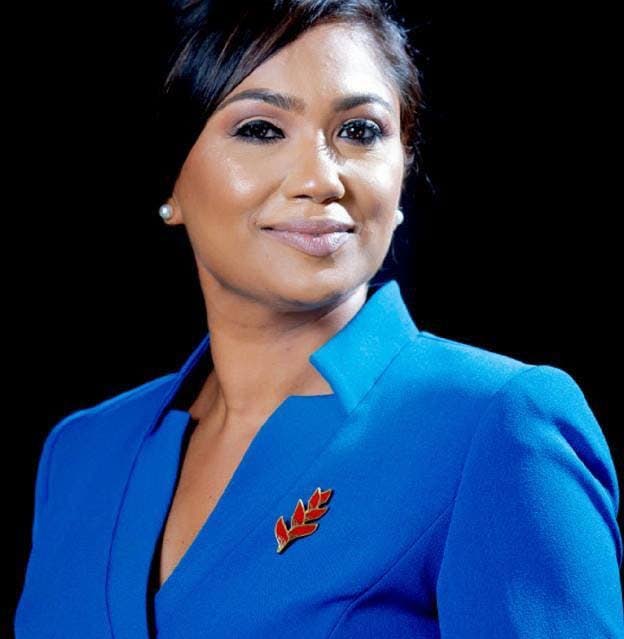Put a woman

PNM candidate Sharon Baboolal will lose her bid to represent the Princes Town constituency in the parliamentary election Monday after next. That’s no surprise. It’s neither a marginal seat nor a close race.
Should she measure in line with history, she’ll poll somewhere in the 30-per-cents, as every PNM candidate for the seat has over the last nine elections, even the 1986 NAR blowout.
So how can a candidate like her, with little prospect of a win, focus her campaign on the party’s national platform? What is the political message she can carry that makes most sense, one that will resonate?
While the long tradition of the glossy written manifesto is yet to be honoured by the PNM this year, what is the party’s shared pitch for why its candidates should be entrusted to lead the country through one of its most challenging economic and crime periods in memory? A “moment of crisis,” as it’s been described on the hustings.
Baboolal and her party seem to have found a signature message for her constituents.
On Wednesday, opening the virtual St James rally, where the party historically focuses the platform on gender (broadcast this year from Queen's Hall), its lady vice chairman Camille Robinson-Regis took to the microphone. She reminded us that the idea that giving a woman a chance produces a more nurturing outlook in governance was something we were fooled by in 2010. Electing Kamla, we instead reaped woe, pain and corruption from “that woman.” Wrapped into both Kamla’s destructiveness and her deception was her gender.
Then, in almost the same breath, Robinson-Regis boasted of the 14 women the PNM was putting into leadership as candidates, a third of its slate. (The majority of them, however, like Baboolal, are contesting constituencies they are more than likely to lose. Only five are running in safe seats.)
But gender took a whole new turn when Baboolal took the stage. As she droned from an otherwise dull script, the crowd suddenly broke into wild applause.
Thirty-nine years after the last PNM representative (Amoy Mohammed) to capture the Princes Town seat, she urged, “It’s time to put another real woman in charge.”
Applauding Baboolal’s concluded presentation, Robinson-Regis repeated approvingly: “Put a real woman in Princes Town.”
The reference is, transparently, to the assumed sexual orientation of the flamboyant former MP and UNC candidate for the constituency, Barry Padarath, who recently became a parent while declining to respond to public curiosity about the biological origins and gestation of his daughter.
Starting with comments from a Facebook account Colm Imbert asserted was hacked, and a schoolyard reference to Padarath as the "Princess for…sorry, member for Princes Town" by Daryl Smith and a miscount of the number of women on the UNC bench in Smith’s maiden debate in 2015, Padarath has been the subject of five years of picong from the PNM parliamentary bench, some of which his gestures and responses fuel.
If Baboolal’s innuendo left anything to imagination, quickly memes appeared online with the PNM symbol showing Baboolal in one half of the frame and Padarath in the other.
In 2010, the St James rally became a desperate last stand with a naked appeal to homophobia in an election Patrick Manning lost decisively.
But that’s neither the case nationally in 2020, nor in Princes Town.
So why go there? Because it’s easy to? How many seats does it win?
Over and over we’ve seen the 62-year-old PNM lady vice chairman on the hustings seem to relish sexual innuendo and to display little capacity for restraint when the opportunity for picong and bacchanal arises.
To laughing applause from the political leader and others. Later Wednesday, she described UNC Toco-Sangre Grande candidate Nabila Greene as doing her own good job of exposing herself. She suggested party PRO Anita Haynes is Kamla’s newest best friend, an implication of a sexual relationship.
When Keith Rowley gets on his high-dudgeon horse about Kamla’s racist comments, his moral authority is thoroughly diminished when his party’s other leaders consistently engage in petty and bullying picong over sexuality.
Both parties appear on an equal footing in making cheap appeals to nastiness and stereotypes that do little to convert anyone.
What’s equally puzzling is the PNM women’s gendered demonisation of Kamla. They keep repeating that putting a woman as prime minister in 2010 was a lethal mistake, while they appeal to us to put a “real” woman in Princes Town.
The election results in a week will fundamentally shape the nation’s future for decades.
Yet so little of the campaigns reflects any seriousness about the economy or policy. A deep cynicism is breeding not just about the ballot box, but about state governance as a whole as the solution to social and economic challenges.
I won’t be around for those decades.
And I won’t vote this year. Or spoil my ballot.
But I am searching for new forms of governance that make sense.


Comments
"Put a woman"